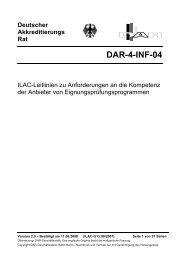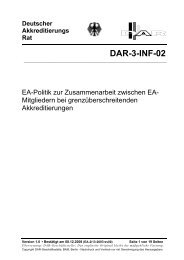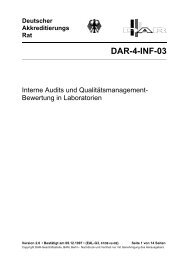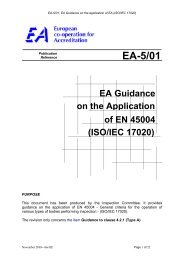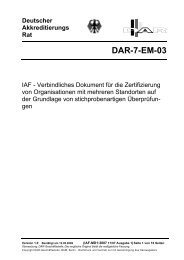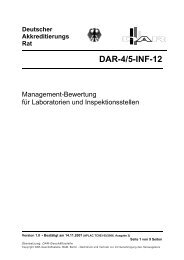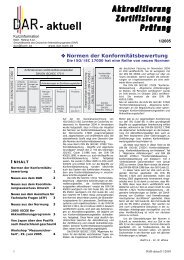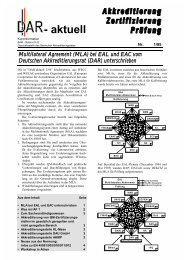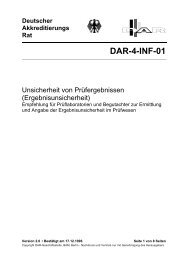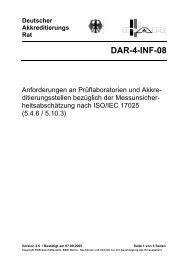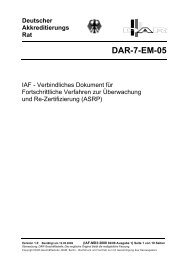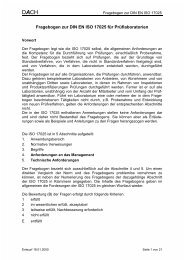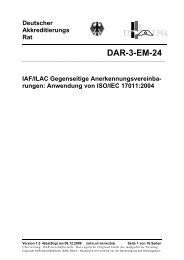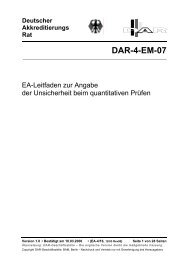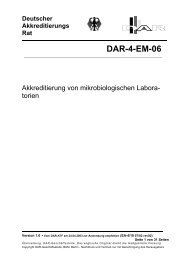(MLA) of EAL and EAC signed by the Deutscher Akkreditierungsrat
(MLA) of EAL and EAC signed by the Deutscher Akkreditierungsrat
(MLA) of EAL and EAC signed by the Deutscher Akkreditierungsrat
Create successful ePaper yourself
Turn your PDF publications into a flip-book with our unique Google optimized e-Paper software.
- aktuell<br />
Newsletter<br />
BAM - Departmental Section S.42<br />
Secretariat <strong>of</strong> <strong>the</strong> German Accreditation Council (DAR)<br />
Multilateral Agreement (<strong>MLA</strong>) <strong>of</strong> <strong>EAL</strong> <strong>and</strong> <strong>EAC</strong><br />
<strong>signed</strong> <strong>by</strong> <strong>the</strong> <strong>Deutscher</strong> <strong>Akkreditierungsrat</strong> (DAR)<br />
The organisation <strong>EAL</strong> (European Cooperation for<br />
Accreditation <strong>of</strong> Laboratories), merged from <strong>the</strong> former<br />
WECC <strong>and</strong> WELAC <strong>and</strong> described in "DAR-aktuell<br />
2/94", has developed a procedure <strong>of</strong> mutual evaluation<br />
<strong>of</strong> <strong>the</strong>ir accreditation systems with <strong>the</strong> aim to reach<br />
equivalent accreditations <strong>by</strong> <strong>the</strong> Accreditation Bodies<br />
members <strong>of</strong> <strong>EAL</strong>. <strong>EAC</strong> (European Accreditation <strong>of</strong><br />
Certification) is proceeding analogously.<br />
In this way <strong>the</strong> accreditation systems <strong>of</strong> <strong>the</strong> <strong>EAL</strong><br />
members have been evaluated one after ano<strong>the</strong>r, i.e.<br />
<strong>the</strong>y have been evaluated on <strong>the</strong> basis <strong>of</strong> an approved<br />
procedure <strong>by</strong> an evaluation team.<br />
The evaluation procedure consists <strong>of</strong> <strong>the</strong> following<br />
steps:<br />
1. After disposing <strong>of</strong> a complete structure <strong>and</strong> documentation<br />
according to EN 45 003, <strong>the</strong> accreditation<br />
body applies through <strong>the</strong> national accreditation<br />
system for membership in <strong>the</strong> Multilateral<br />
Agreement (<strong>MLA</strong>).<br />
2. Conditions: It must have carried out at less a<br />
surveillance visit <strong>and</strong> it can name four laboratories<br />
for evaluation, <strong>the</strong> assessment <strong>of</strong> which may be<br />
witnessed <strong>by</strong> <strong>the</strong> evaluation team (a so-called<br />
witness audit).<br />
3. The Quality Manual as well as practical preparations<br />
<strong>and</strong> performances <strong>of</strong> assessment visits are examined.<br />
The evaluation team gives a report to <strong>the</strong><br />
responsible committee, which in turn gives a recommendation<br />
to <strong>the</strong> General Assembly.<br />
4. Re-evaluations are planned to be carried out in<br />
predetermined intervals.<br />
Content Page<br />
• <strong>MLA</strong> <strong>of</strong> <strong>EAL</strong> <strong>and</strong> <strong>EAC</strong> <strong>signed</strong> <strong>by</strong> <strong>the</strong> DAR 1<br />
What is IAF? 2<br />
About expert services<br />
Accreditation <strong>of</strong> quality system certifica-<br />
3<br />
tion bodies in <strong>the</strong> m<strong>and</strong>atory <strong>and</strong> voluntary<br />
area 3<br />
Accreditation body KL-MESS 3<br />
Accreditation body DAU GmbH 3<br />
Accreditation body AKMP<br />
News from st<strong>and</strong>ardisation:<br />
3<br />
Information on EN 45001/003/010/011/012 4<br />
Workshop in A<strong>the</strong>ns 4<br />
No. 1/95<br />
Due to historical reasons <strong>the</strong>re are two <strong>EAL</strong> <strong>MLA</strong>s, one<br />
for <strong>the</strong> accreditation <strong>of</strong> testing laboratories <strong>and</strong> one for<br />
<strong>the</strong> accreditation <strong>of</strong> calibration laboratories. The first<br />
<strong>MLA</strong> for calibration was already <strong>signed</strong> years ago.<br />
FINAS<br />
<strong>EAL</strong><br />
Multilateral Agreement<br />
Calibration<br />
SWEDAC<br />
SF<br />
ENAC<br />
UKAS<br />
S<br />
E<br />
BKO B<br />
UK<br />
INAB<br />
BNM<br />
SIT NA<br />
I<br />
DKD<br />
IRL<br />
D<br />
SANCS (South Africa)<br />
F<br />
DANAK<br />
SCS<br />
N<br />
DK<br />
NKO/STERIN/<br />
STERLAB NL<br />
By decision <strong>of</strong> <strong>the</strong> <strong>EAL</strong>-General Assembly (in<br />
December 1994 <strong>and</strong> in May 1995) DAP, DATech <strong>and</strong><br />
DEKITZ became signatories <strong>of</strong> <strong>the</strong> <strong>MLA</strong> for testing.<br />
FINAS<br />
<strong>EAL</strong><br />
Multilateral Agreement<br />
Testing<br />
SWEDAC<br />
SF<br />
ENAC<br />
BMwA<br />
UKAS<br />
S<br />
E<br />
INAB<br />
COFRAC<br />
SINAL NA<br />
A<br />
UK<br />
I<br />
IRL<br />
DAR D<br />
DAP,DATech,DEKITZ<br />
DANAK<br />
SAS<br />
CH<br />
NATA (Australia)<br />
TELARC (New Zeal<strong>and</strong>)<br />
HOKLAS (Hongkong)<br />
F<br />
N<br />
IPQ<br />
DK<br />
RvA<br />
CH<br />
P<br />
NL
On 13th October, 1995 <strong>the</strong> <strong>EAL</strong>-<strong>MLA</strong> was <strong>signed</strong> <strong>by</strong><br />
<strong>the</strong> Chairman <strong>of</strong> <strong>the</strong> German Accreditation Council,<br />
Pr<strong>of</strong>. Dr. Mittmann, for <strong>the</strong> German accreditation<br />
bodies DAP, DATech <strong>and</strong> DEKITZ. For <strong>the</strong> time being<br />
a common text is elaborated so as to create equal conditions<br />
for <strong>the</strong> accreditation <strong>of</strong> testing <strong>and</strong> calibration<br />
laboratories <strong>and</strong> to regulate <strong>the</strong>rewith <strong>the</strong> mutual recognition<br />
<strong>of</strong> accreditation systems outside Europe.<br />
On 18th May, 1995 <strong>the</strong> <strong>EAC</strong>-<strong>MLA</strong> was <strong>signed</strong> <strong>by</strong><br />
<strong>the</strong> Chairman <strong>of</strong> <strong>the</strong> German Accreditation Council,<br />
Pr<strong>of</strong>. Dr. Mittmann, at first for <strong>the</strong> accreditation body<br />
TGA.<br />
From left to right (st<strong>and</strong>ing): Jaunin (CH), Ettarp (S),<br />
Hattula (SF), Hekscher (S), Gundlach (NL), Hammer<br />
(UK), Sæteren (N), (sitting): Martinotti (I), Mittmann (D)<br />
What does <strong>the</strong> signing <strong>of</strong> such a Multilateral<br />
Agreement mean for <strong>the</strong> accredited testing laboratories<br />
<strong>and</strong> certification bodies? Here we exclusively<br />
speak about <strong>the</strong> voluntary area, where <strong>the</strong> client <strong>of</strong> a<br />
testing laboratory decides, whe<strong>the</strong>r or not he accepts<br />
<strong>the</strong> accreditation <strong>of</strong> this specific testing laboratory <strong>by</strong> a<br />
certain accreditation body. He can dem<strong>and</strong> for an<br />
News from international organisations<br />
What is IAF?<br />
The International Accreditation Forum (IAF) unifies<br />
accreditation systems for certification bodies from 19<br />
countries <strong>of</strong> all continents as well as representatives<br />
from European <strong>and</strong> international organisations that<br />
show an interest in <strong>the</strong> accreditation <strong>of</strong> certification<br />
bodies for quality systems, products <strong>and</strong> personnel.<br />
The IAF Memor<strong>and</strong>um <strong>of</strong> Underst<strong>and</strong>ing (MoU) was<br />
<strong>signed</strong> on <strong>the</strong> June Meeting in 1995 after round two<br />
years <strong>of</strong> discussion <strong>and</strong> preliminary work. The Chairman<br />
<strong>of</strong> DAR, Pr<strong>of</strong>. Dr. Mittmann, has <strong>signed</strong> <strong>the</strong> MoU<br />
as representative <strong>of</strong> <strong>the</strong> German accreditation bodies.<br />
The aim <strong>of</strong> IAF is to reach <strong>the</strong> international acceptance<br />
<strong>of</strong> certificates via <strong>the</strong> mutual recognition <strong>of</strong><br />
accreditations. To harmonise <strong>the</strong> accreditation criteria,<br />
an intensive exchange <strong>of</strong> experience is <strong>the</strong>refore<br />
needed. At present a Multilateral Recognition Agreement<br />
(MRA) is being prepared, <strong>the</strong> objective <strong>of</strong> which<br />
is to reach a world-wide recognition <strong>of</strong> accreditations<br />
on <strong>the</strong> basis <strong>of</strong> recognition agreements<br />
2<br />
accreditation <strong>by</strong> a certain accreditation body. This<br />
could mean that a testing laboratory that <strong>of</strong>fers testing<br />
services in various countries or tests products being<br />
exported <strong>by</strong> various countries, needs accreditations<br />
from various national accreditation bodies. Just this<br />
situation shall be prevented <strong>by</strong> <strong>the</strong> Global Approach <strong>of</strong><br />
<strong>the</strong> Commission <strong>of</strong> <strong>the</strong> European Communities for <strong>the</strong><br />
elimination <strong>of</strong> technical barriers to trade. Therefore <strong>the</strong><br />
<strong>MLA</strong> enables <strong>the</strong> client to get a certification from <strong>the</strong><br />
testing laboratory which confirms that its accreditation<br />
is comparable with ano<strong>the</strong>r accreditation granted <strong>by</strong><br />
ano<strong>the</strong>r accreditation body being member <strong>of</strong> <strong>the</strong> <strong>MLA</strong>.<br />
Thus <strong>the</strong> acceptance <strong>of</strong> testing results is being improved<br />
in Europe.<br />
However, <strong>the</strong> essential result <strong>of</strong> <strong>the</strong> Multilateral<br />
Agreement should be a harmonisation <strong>of</strong> <strong>the</strong> accreditations<br />
concerning <strong>the</strong>ir performance <strong>and</strong> <strong>the</strong>ir results<br />
as well as <strong>the</strong> comparability <strong>of</strong> test results <strong>and</strong> certificates.<br />
SWEDAC<br />
DAR<br />
FINAS<br />
S<br />
D<br />
TG A, DAP, DATech, DEKITZ<br />
<strong>EAC</strong><br />
Multilateral Agreement<br />
Certification<br />
SF<br />
UKAS<br />
SINCERT NA<br />
UK<br />
RvA<br />
I N<br />
SAS<br />
<strong>of</strong> regional groups (as e.g. <strong>the</strong> <strong>EAC</strong>-<strong>MLA</strong>). The advantage<br />
<strong>of</strong> accreditation bodies that are members <strong>of</strong> <strong>the</strong><br />
<strong>EAC</strong>-<strong>MLA</strong> (as e.g. also German bodies) is that no reevaluation<br />
<strong>by</strong> an international team will be needed.<br />
Merely a repeated evaluation <strong>by</strong> ano<strong>the</strong>r team is carried<br />
out.<br />
For <strong>the</strong> time being Working Groups are preparing <strong>the</strong><br />
Multilateral Agreement on <strong>the</strong> basis <strong>of</strong> <strong>the</strong> experience<br />
<strong>of</strong> <strong>EAC</strong>. They are intensively discussing <strong>the</strong> different<br />
accreditation criteria or requirements in <strong>the</strong> various<br />
sectors.<br />
WG1<br />
IAF-Recommendations<br />
IAF<br />
International Accreditation Forum<br />
WG2<br />
Multilateral Agreement<br />
Fur<strong>the</strong>r information: Subdepartmental Section S.42<br />
NL<br />
CH<br />
WG3<br />
Sector-specific<br />
applications
News from <strong>the</strong> DAR<br />
New DAR logo<br />
On <strong>the</strong> last DAR meeting on 12th September, 1995 a<br />
new DAR logo was endorsed, which may be used <strong>by</strong><br />
<strong>the</strong> accredited bodies for advertisement purposes (see<br />
figure).<br />
About expert services<br />
<strong>Deutscher</strong><br />
Akkreditierungs<br />
Rat<br />
<br />
Difficulties in expert services exist concerning <strong>the</strong><br />
European recognition <strong>of</strong> nationally appointed experts.<br />
Therefore <strong>the</strong> 17th DAR-meeting on 10th May, 1995<br />
dealt with this topic - starting from <strong>the</strong> enquiries <strong>of</strong><br />
technical experts working individually or in firms <strong>of</strong><br />
engineers.<br />
The discussion within <strong>the</strong> DAR gave <strong>the</strong> following<br />
results:<br />
− Laboratories that perform testing activity may be<br />
fur<strong>the</strong>rmore accredited according to EN 45 001.<br />
− Individual persons who <strong>of</strong>fer <strong>the</strong> services <strong>of</strong> experts<br />
may be certified <strong>by</strong> a certification body for<br />
personnel according to EN 45 013.<br />
Agreement could be reached on <strong>the</strong> fact that <strong>the</strong> personnel<br />
<strong>of</strong> accredited laboratories do not need to be<br />
certified separately, as <strong>the</strong> qualification <strong>of</strong> <strong>the</strong> personnel<br />
is being already confirmed <strong>by</strong> <strong>the</strong> accreditation.<br />
The EUROLAB group "Assessment <strong>of</strong> Expert<br />
Services" has adopted recommendations that are valid<br />
for different cases. These recommendations have been<br />
discussed within <strong>the</strong> DAR. For <strong>the</strong> preparation <strong>of</strong> a<br />
draft for a resolution an Adhoc-Group has been set up.<br />
This group will present its results on <strong>the</strong> next DARmeeting.<br />
Accreditation <strong>of</strong> quality system certification<br />
bodies in <strong>the</strong> m<strong>and</strong>atory <strong>and</strong> voluntary area<br />
There are two new agreements on cooperation in <strong>the</strong><br />
field <strong>of</strong> accreditation <strong>of</strong> quality system certification<br />
bodies, namely between TGA (Association for<br />
Accreditation) <strong>and</strong> BAPT (German Federal Office <strong>of</strong><br />
Posts <strong>and</strong> Telecommunications) <strong>and</strong> between TGA <strong>and</strong><br />
KBA (German Federal Authority <strong>of</strong> Road Transport).<br />
According to <strong>the</strong>se agreements it is planned to treat<br />
accreditation procedures in common <strong>and</strong> to deal with<br />
<strong>the</strong>m in joint accreditation committees.<br />
The contracts are available in <strong>the</strong> DAR Secretariat.<br />
Accreditation body KL-MESS<br />
3<br />
Since September 1995 <strong>the</strong> recently founded accreditation<br />
body KL-MESS (Coordination Body <strong>of</strong> <strong>the</strong> Federal<br />
States "Measuring Instruments" <strong>of</strong> <strong>the</strong> Metrology<br />
<strong>and</strong> Verification Authorities <strong>of</strong> <strong>the</strong> Federal States) is a<br />
member <strong>of</strong> <strong>the</strong> DAR. KL-MESS has its seat at <strong>the</strong><br />
L<strong>and</strong>esamt für Meß- und Eichwesen in Thuringia.<br />
KL-MESS performs accreditations in <strong>the</strong> field <strong>of</strong> metrology<br />
in <strong>the</strong> m<strong>and</strong>atory area, namely for <strong>the</strong> testing <strong>of</strong><br />
gas, water, electricity <strong>and</strong> heat meters. This body was<br />
set up to coordinate <strong>and</strong> to concentrate <strong>the</strong> work <strong>of</strong> <strong>the</strong><br />
various metrology <strong>and</strong> verification authorities<br />
"Eichdirektionen". Within <strong>the</strong> DAR KL-MESS takes on<br />
<strong>the</strong> seat <strong>and</strong> <strong>the</strong> vote <strong>of</strong> <strong>the</strong> authorities "Eichämter". In<br />
future all accreditations based on <strong>the</strong> activities <strong>of</strong> <strong>the</strong><br />
various metrology <strong>and</strong> verification authorities<br />
"Eichämter" will be granted <strong>by</strong> KL-MESS.<br />
Accreditation body DAU GmbH<br />
The state <strong>of</strong> <strong>the</strong> implementation <strong>of</strong> <strong>the</strong> "Environmental<br />
Management <strong>and</strong> Audit Scheme Regulation" (EMAS)<br />
has been presented within <strong>the</strong> DAR-Committee<br />
"Cooperation between m<strong>and</strong>atory <strong>and</strong> voluntary area"<br />
as well as <strong>the</strong> Approval, Supervising <strong>and</strong> Registration<br />
System for <strong>the</strong> Implementation <strong>of</strong> EMAS founded at<br />
<strong>the</strong> DAU GmbH (German Association for<br />
Accreditation <strong>and</strong> Approval <strong>of</strong> Environmental<br />
Auditors). This system has been set up <strong>by</strong> consensus<br />
between <strong>the</strong> Government (BMU - German Federal<br />
Ministry for Environmental Affairs), <strong>the</strong> German<br />
industry (BDI - Federation <strong>of</strong> German Industry) <strong>and</strong> <strong>the</strong><br />
IHK (Chamber <strong>of</strong> Commerce). DAU GmbH is a limited<br />
company <strong>the</strong> shareholders <strong>of</strong> which are among o<strong>the</strong>rs:<br />
BDI, several member associations <strong>of</strong> <strong>the</strong> BDI, DIHT,<br />
Central Association <strong>of</strong> <strong>the</strong> German Trade. The DAU<br />
GmbH shall be responsible for <strong>the</strong> approval <strong>of</strong> <strong>the</strong><br />
environmental auditors mentioned in <strong>the</strong> EMAS. The<br />
Federal law for <strong>the</strong> implementation <strong>of</strong> EMAS has not<br />
yet been put into force. Therefore temporary solutions<br />
are applied. It is planned that <strong>the</strong> L<strong>and</strong> Environment<br />
Agencies carry out <strong>the</strong>ir approvals on <strong>the</strong> basis <strong>of</strong> <strong>the</strong><br />
tests performed <strong>by</strong> <strong>the</strong> DAU GmbH. It is expected to<br />
pass a respective Federal law in autumn 1995 that will<br />
comprise <strong>the</strong> final regulation <strong>of</strong> this procedure.<br />
Accreditation body <strong>of</strong> <strong>the</strong> States for testing<br />
laboratories that execute <strong>the</strong> hazardous substances<br />
law (AKMP)<br />
The accreditation body <strong>of</strong> <strong>the</strong> states for testing laboratories<br />
that execute <strong>the</strong> hazardous substances law<br />
(AKMP) has been set up in July 1994. Its basis is <strong>the</strong><br />
"Agreement on <strong>the</strong> Central Body <strong>of</strong> <strong>the</strong> States for Safe<br />
Technology <strong>and</strong> <strong>the</strong> Accreditation Body <strong>of</strong> <strong>the</strong> States<br />
for Testing Laboratories that Execute <strong>the</strong> Hazardous<br />
Substances Law" <strong>of</strong> 16/17 December 1993. The task <strong>of</strong><br />
AKMP is to accredit testing laboratories which - on<br />
behalf <strong>of</strong> employers - undertake investigations, tests<br />
<strong>and</strong> assessments <strong>of</strong> airborne concentrations <strong>of</strong><br />
hazardous substances at work places. Since August<br />
1995 AKMP is operating in <strong>the</strong> DAR-Committee AZ
(Cooperation between M<strong>and</strong>atory <strong>and</strong> Voluntary Area)<br />
It operates according to EN 45 003.<br />
News from st<strong>and</strong>ardisation<br />
The EN 45 003 st<strong>and</strong>ard "Accreditation Systems for<br />
Calibration <strong>and</strong> Testing Laboratories, General Requirements<br />
for Operation <strong>and</strong> Recognition" (identical<br />
in wording with <strong>the</strong> ISO/IEC Guide 58:1993) has been<br />
reviewed in rotation <strong>and</strong> adopted in May 1995. Concerning<br />
<strong>the</strong> assessment <strong>of</strong> laboratories, it comprises all<br />
requirements that were laid down in <strong>the</strong> EN 45 002<br />
until now.<br />
The EN 45 002 st<strong>and</strong>ard "General Criteria for <strong>the</strong> Assessment<br />
<strong>of</strong> Testing Laboratories" is still valid <strong>and</strong> may<br />
be applied, e.g. <strong>by</strong> certification bodies or o<strong>the</strong>r bodies<br />
that subcontract testing tasks <strong>and</strong> for this purpose have<br />
to perform an assessment.<br />
The EN 45 010 st<strong>and</strong>ard "General Criteria for <strong>the</strong><br />
Assessment <strong>and</strong> Accreditation <strong>of</strong> Certification/ Registration<br />
Bodies" (identical in wording with ISO/CASCO<br />
226/ Rev. 2 <strong>and</strong> <strong>the</strong> future ISO/IEC-<br />
4<br />
Fur<strong>the</strong>r information: Subdepartmental Section S.42<br />
Guide 61) <strong>and</strong> <strong>the</strong> reviewed EN 45 012 st<strong>and</strong>ard<br />
"General Criteria for Bodies Assessing <strong>and</strong> Certifying<br />
Quality Systems" (identical in wording with<br />
ISO/CASCO 227/ Rev. 2 <strong>and</strong> <strong>the</strong> future ISO/IEC-<br />
Guide 62) will be adopted soon.<br />
The EN 45 011 st<strong>and</strong>ard "General Criteria for Bodies<br />
Certifying Products" (identical in wording with<br />
ISO/CASCO 228/ Rev. 2) is being reviewed <strong>and</strong> is now<br />
in <strong>the</strong> process to be adopted.<br />
The EN 45 001 st<strong>and</strong>ard is being reviewed <strong>and</strong> afterwards<br />
shall be identical in wording with ISO/IEC<br />
Guide 25 which is being reviewed, too. In June 1996<br />
<strong>the</strong> first draft <strong>of</strong> <strong>the</strong> new ISO Guide 25 shall be<br />
submitted to ISO/CASCO.<br />
Fur<strong>the</strong>r information: Subdepartmental Section S. 42<br />
Workshop on accreditation questions, organised <strong>by</strong> <strong>the</strong> EU Commission,<br />
held in A<strong>the</strong>ns, on 18./19.09.95<br />
This Workshop has been organised <strong>by</strong> <strong>the</strong> Commission <strong>of</strong> <strong>the</strong> EU DG III with <strong>the</strong> aim to introduce several accreditation<br />
systems <strong>and</strong> to give support to <strong>the</strong> Greece Government in establishing an accreditation system. From <strong>the</strong> point<br />
<strong>of</strong> view <strong>of</strong> <strong>the</strong> European Commission Mr. McMillan presented general principles for national accreditation systems:<br />
• The accreditation is <strong>the</strong> independent, technical, non-pr<strong>of</strong>it making "Civil Arm" <strong>of</strong> <strong>the</strong> government.<br />
• Accreditation is a service <strong>of</strong>fered to <strong>the</strong> industry.<br />
• According to <strong>the</strong> Commission <strong>of</strong> <strong>the</strong> EU one accreditation system per member state should exist. It shall make its<br />
work transparent.<br />
• The national accreditation systems shall cooperate in <strong>EAL</strong> <strong>and</strong> <strong>EAC</strong>.<br />
• On <strong>the</strong> basis <strong>of</strong> evaluation procedures (mutual surveillance visits) Multilateral Agreements should be concluded<br />
between <strong>the</strong> accreditation systems in order to harmonise <strong>the</strong> accreditations in <strong>the</strong> member states <strong>and</strong> to promote<br />
<strong>the</strong> mutual recognition <strong>of</strong> test results <strong>and</strong> certificates.<br />
The presentation <strong>of</strong> <strong>the</strong> various accreditation bodies showed <strong>the</strong> following tendency:<br />
− The structures <strong>of</strong> <strong>the</strong> accreditation systems reflect <strong>the</strong> national requirements <strong>and</strong> conditions.<br />
− In several countries <strong>the</strong> accreditation activities are being concentrated <strong>by</strong> merging <strong>the</strong> already existing accreditation<br />
bodies:<br />
• United Kingdom: NAMAS + NACCB ⇒ UKAS<br />
• The Ne<strong>the</strong>rl<strong>and</strong>s: NKO/STERIN/STERLAB + RvC ⇒ RvA<br />
• France: COFRAC unites under a recently founded accreditation body several sectors for <strong>the</strong> accreditation<br />
<strong>of</strong> laboratories, inspection bodies, certification bodies <strong>and</strong> Environmental Management Audit Schemes.<br />
− All accreditation systems get financial support from <strong>the</strong>ir governments, associations <strong>of</strong> industry a.o.<br />
− There are as well private, non-pr<strong>of</strong>it making accreditation bodies as purely governmental bodies (mostly departments<br />
<strong>of</strong> <strong>the</strong> ministries for industry).<br />
− Most <strong>of</strong> <strong>the</strong> accreditation bodies do not only carry out accreditations <strong>of</strong> testing <strong>and</strong> calibration laboratories <strong>and</strong> <strong>of</strong><br />
certification bodies, but also GLP recognition <strong>and</strong> <strong>the</strong> tasks connected with <strong>the</strong> Environmental Management Audit<br />
Scheme Regulation.<br />
During <strong>the</strong> discussion Mr. McMillan as a representative <strong>of</strong> <strong>the</strong> European Commission as well as <strong>the</strong> majority <strong>of</strong> <strong>the</strong><br />
accreditation bodies emphasised that only those accreditation bodies which are ready to open <strong>the</strong>ir way <strong>of</strong> working<br />
<strong>and</strong> to be evaluated on <strong>the</strong> basis <strong>of</strong> a commonly accepted evaluation procedure, establish confidence in <strong>the</strong>ir work<br />
towards <strong>the</strong> o<strong>the</strong>r national accreditation bodies <strong>and</strong> <strong>the</strong>rewith create a basis for a mutual recognition.<br />
Imprint:<br />
Editor: Bundesanstalt für Materialforschung und -prüfung (BAM), DAR-Secretariat, Unter den Eichen 87, D-12205<br />
Berlin, GERMANY, ( (+30) 8104 1942, October 1995; Responsible for redaction: Dr. M. Wloka



